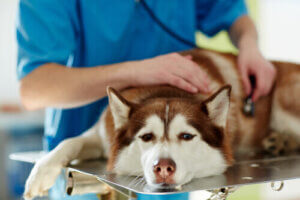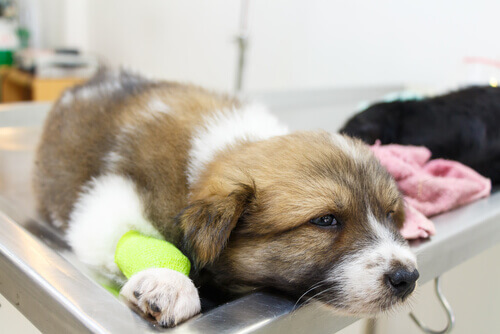The Causes of Convulsions in Dogs


Written and verified by the vet Juan Pedro Vazquez Espeso
On most occasions, dog owners are the first to detect the symptoms of any illness their pets experience. Some of these symptoms can go unnoticed, including fever, paleness in the mucous membranes, or redness in the ears. Others, however, are much more noticeable given their nature. Such is the case with convulsions. In the following article, we want to take a look at the causes of convulsions in dogs.
Convulsive syndrome
First, it’s important to define what a convulsion is. A convulsion consists of a clinical manifestation of a temporary cerebral dysfunction. It’s important to emphasize the temporary nature of convulsions since they tend to last seconds or minutes.
This dysfunction occurs due to a sudden, massive, and synchronized discharge of cortical neurons. In other words, it’s as if all of the neurons, at the same time, suddenly go from being calm and relaxed to jumping out of control.
This temporary neural chaos produces the following alterations in a dog’s body:
- Loss of consciousness or reduced consciousness. Dogs may become unconscious and stop responding to external stimuli.
- Out of control or altered muscular movements.
- Abnormal behavior, like following imaginary flies.
- Activation of the vegetative nervous system: Salivation, urination, defecation.
It’s worth pointing out that this convulsive crisis is always a sign of illness, but not an illness in and of itself. Therefore, veterinarians will always approach the disorder as the tip of the iceberg. In other words, it’s a starting point from which to continue investigating in order to arrive at a proper diagnosis.

Causes of convulsions in dogs
We can divide the causes of convulsions in dogs into two groups in order to explain them more easily.
Intracranial causes
In this case, the alteration that’s producing the convulsive crisis is located within the brain. Any lesion that affects the cerebral cortex can lead to the appearance of convulsions in an individual. In general terms, we’re talking about:
- Inflammation of the cerebral tissue (encephalitis) present in illnesses like canine distemper.
- Cranial traumatisms as a result of bumps or falls.
- Congenital malformations, such as hydrocephalus.
- Primary neoplasia of cerebral origin, and also secondary cerebral metastasis.
- Cerebrovascular accidents.
Any of these anomalies can potentially cause a convulsive crisis. Logically, the above-mentioned circumstances and that characteristic neural revolution must take place. And this will depend on the region of the brain where injury exists as well as the severity of the problem.
Extracranial causes
Here, we’re going to talk about all of the causes of convulsions in dogs that aren’t the result of brain injury. In other words, the causes that don’t fall into the previous category. There are pathological processes that, though they develop far from the brain, they have a direct impact on this organ. And, therefore, can cause convulsions.
- Intoxication: There are various toxins that can cause problems in dogs. Lead, organophosphates, and strychnine are some of the most common culprits.
- Hypoglycemia: Low blood sugar levels, especially in the case of puppies, which can cause convulsions. It’s important to be careful when feeding puppies in order to avoid hypoglycemia, among other problems.
- Portosystemic shunts: This refers to an anomalous communication in blood circulation, specifically between venous and arterial circulation. This derivation prevents the liver from purifying waste substances that are present in the blood. As a result, it produces an “intoxication” in the animal’s body, which can lead to convulsions.
- Liver problems: Just like in the case of shunts, when liver failure occurs, this organ is unable to cleanse organ waste correctly. The medical term for this malfunction is liver cirrhosis and it commonly involves convulsions.

Convulsions of idiopathic origin
Occasionally, veterinarians are unable to determine what’s producing the symptoms because there’s no apparent or detectable cause. In these cases, we use the term “idiopathic” to refer to an illness with an unknown origin.
It turns out that, in many cases, diagnosing or finding the underlying illness isn’t possible. In fact, this is the most frequent cause of convulsions in dogs. However, with proper treatment, there’s usually a good prognosis.
In general, we’ve gone over the most frequent causes of convulsions in dogs. Just the same, the causes can be diverse and, in every case, require immediate action.
Therefore, if you suspect that your dog has suffered from a convulsion, seek immediate veterinary attention.
On most occasions, dog owners are the first to detect the symptoms of any illness their pets experience. Some of these symptoms can go unnoticed, including fever, paleness in the mucous membranes, or redness in the ears. Others, however, are much more noticeable given their nature. Such is the case with convulsions. In the following article, we want to take a look at the causes of convulsions in dogs.
Convulsive syndrome
First, it’s important to define what a convulsion is. A convulsion consists of a clinical manifestation of a temporary cerebral dysfunction. It’s important to emphasize the temporary nature of convulsions since they tend to last seconds or minutes.
This dysfunction occurs due to a sudden, massive, and synchronized discharge of cortical neurons. In other words, it’s as if all of the neurons, at the same time, suddenly go from being calm and relaxed to jumping out of control.
This temporary neural chaos produces the following alterations in a dog’s body:
- Loss of consciousness or reduced consciousness. Dogs may become unconscious and stop responding to external stimuli.
- Out of control or altered muscular movements.
- Abnormal behavior, like following imaginary flies.
- Activation of the vegetative nervous system: Salivation, urination, defecation.
It’s worth pointing out that this convulsive crisis is always a sign of illness, but not an illness in and of itself. Therefore, veterinarians will always approach the disorder as the tip of the iceberg. In other words, it’s a starting point from which to continue investigating in order to arrive at a proper diagnosis.

Causes of convulsions in dogs
We can divide the causes of convulsions in dogs into two groups in order to explain them more easily.
Intracranial causes
In this case, the alteration that’s producing the convulsive crisis is located within the brain. Any lesion that affects the cerebral cortex can lead to the appearance of convulsions in an individual. In general terms, we’re talking about:
- Inflammation of the cerebral tissue (encephalitis) present in illnesses like canine distemper.
- Cranial traumatisms as a result of bumps or falls.
- Congenital malformations, such as hydrocephalus.
- Primary neoplasia of cerebral origin, and also secondary cerebral metastasis.
- Cerebrovascular accidents.
Any of these anomalies can potentially cause a convulsive crisis. Logically, the above-mentioned circumstances and that characteristic neural revolution must take place. And this will depend on the region of the brain where injury exists as well as the severity of the problem.
Extracranial causes
Here, we’re going to talk about all of the causes of convulsions in dogs that aren’t the result of brain injury. In other words, the causes that don’t fall into the previous category. There are pathological processes that, though they develop far from the brain, they have a direct impact on this organ. And, therefore, can cause convulsions.
- Intoxication: There are various toxins that can cause problems in dogs. Lead, organophosphates, and strychnine are some of the most common culprits.
- Hypoglycemia: Low blood sugar levels, especially in the case of puppies, which can cause convulsions. It’s important to be careful when feeding puppies in order to avoid hypoglycemia, among other problems.
- Portosystemic shunts: This refers to an anomalous communication in blood circulation, specifically between venous and arterial circulation. This derivation prevents the liver from purifying waste substances that are present in the blood. As a result, it produces an “intoxication” in the animal’s body, which can lead to convulsions.
- Liver problems: Just like in the case of shunts, when liver failure occurs, this organ is unable to cleanse organ waste correctly. The medical term for this malfunction is liver cirrhosis and it commonly involves convulsions.

Convulsions of idiopathic origin
Occasionally, veterinarians are unable to determine what’s producing the symptoms because there’s no apparent or detectable cause. In these cases, we use the term “idiopathic” to refer to an illness with an unknown origin.
It turns out that, in many cases, diagnosing or finding the underlying illness isn’t possible. In fact, this is the most frequent cause of convulsions in dogs. However, with proper treatment, there’s usually a good prognosis.
In general, we’ve gone over the most frequent causes of convulsions in dogs. Just the same, the causes can be diverse and, in every case, require immediate action.
Therefore, if you suspect that your dog has suffered from a convulsion, seek immediate veterinary attention.
This text is provided for informational purposes only and does not replace consultation with a professional. If in doubt, consult your specialist.








